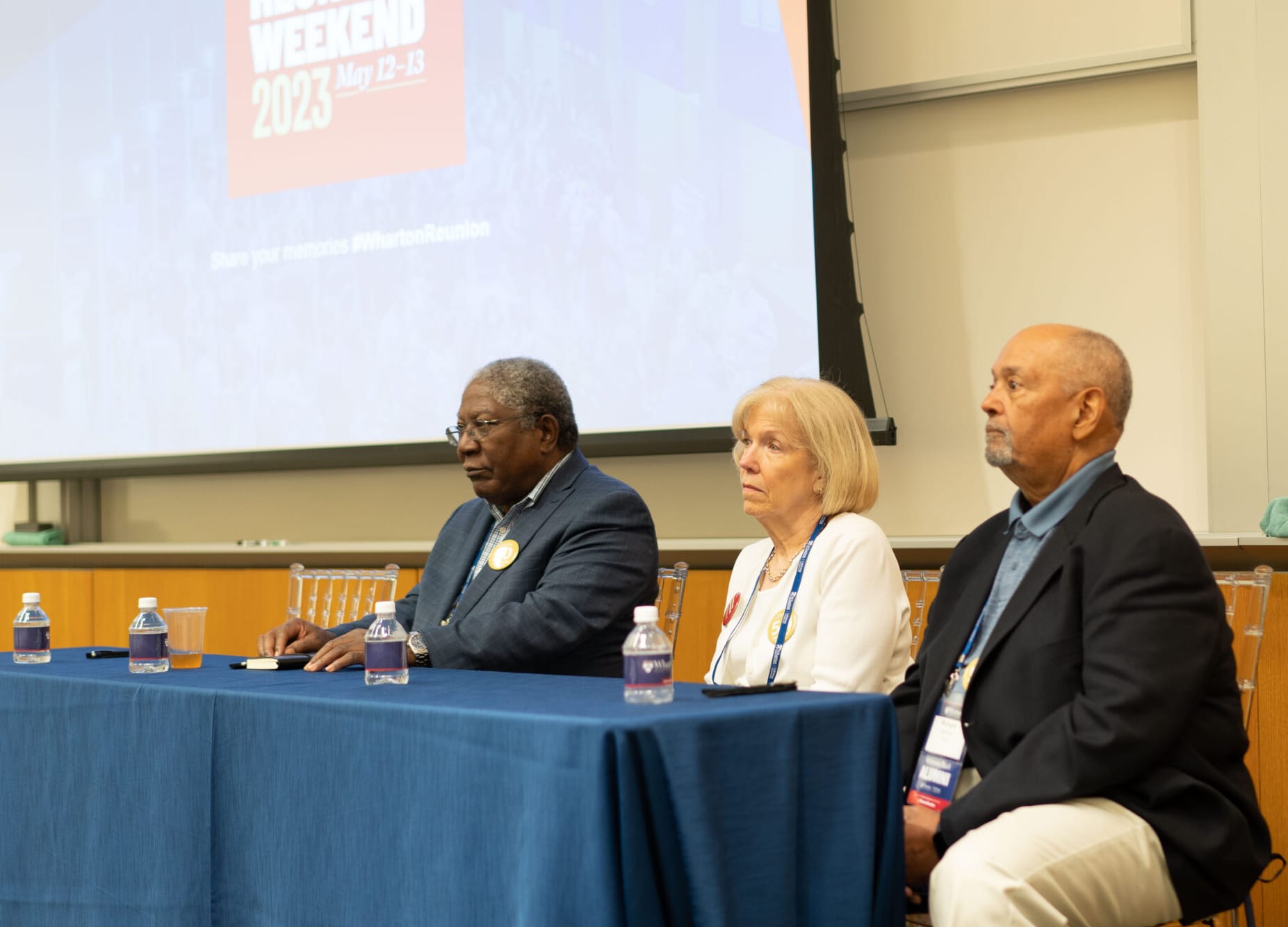Texas Instruments handheld calculators were used for equations. A military draft was sending soldiers overseas. Volkswagen buses still roamed the roads. The year was 1973 and a new Wharton class was preparing to enter the workforce. Earlier this month, a few of them returned to campus to celebrate their 50th reunion and reminisce in an MBA Reunion panel event.
Two bright red “I Met My Spouse At Wharton” pins stood out in the Huntsman Hall classroom. One belonged to Nancy Kelsey Carty WG73, who sat on a panel in the front of the room, and the other to her husband John Carty WG73, who was in the audience. As the only woman on the panel and one of few at Wharton during her time on campus, Nancy Carty was used to fielding remarks about her family life and gender. But she always managed to turn it into something positive.
“A lot of people did say to me, ‘You’re taking the spot of a man,’” she said, to a few incredulous “wows” from the audience. “I got that a couple of times. However, I was the one that always got to take the notes at all our meetings.” While some might be offended, Carty saw the traditionally female task as an advantage — by taking notes, she was able to revisit the material and read it more closely than her classmates.
As two of the few Black students on campus in the 70s, fellow panelists Rick Hackney WG73 and Eugene Aaron WG73 could relate to feeling like the outsiders. “Well, I did have a similar experience,” said Hackney. “How comfortable did I feel recognizing that I was taking the seat that was reserved for someone who was a legacy?”
Black Wharton students found ways to support each other and foster belonging. A few formed a service organization to help struggling businesses in West Philadelphia. But it was their simple get-togethers, such as picnics at the park, which made Aaron feel more confident on campus.
Some Black Wharton students faced additional obstacles when it came to tuition, often taking out loans on top of their scholarships. Aaron was on the GI Bill from serving four years in Germany and Vietnam, but still had to borrow money. He also had a new wife to support. Faced with a crossroads career decision, Aaron knew being a “lifer” in the military wasn’t for him. After telling a counselor he was considering business school, the counselor only gave him one name: Wharton. “The Army is the only thing I had done at that point,” said Aaron, who now looks back on a multifaced career of corporate finance at DuPont and the U.S. foreign service. “And I thought, what is life like?”
Even after being accepted to one of the most prestigious business schools, panelists found that when they entered the real world, they had to prove themselves all over again. “What you learned at Wharton? It doesn’t apply here” — that was the reaction Nancy Carty received at her first marketing job at the Colgate Palmolive Company. She came across another irony in the workforce: despite women making up a huge part of their consumer base, her male colleagues weren’t factoring them into their marketing decisions. “I was glad I was there giving input,” she said.
Hackney also felt a new competition emerge when he started at JP Morgan after graduation. “When I got there, everyone was smart, everyone was gifted, everyone was specialized,” he said, crediting his classmates for preparing him for that setting. “We didn’t realize how privileged we were to be exposed to what Wharton had to offer.”
He sees that same innovative spirit at Wharton now but says students’ motivations have broadened. While most of his ’73 classmates planned to continue a family business or enter the finance world, now he sees a growing demand for entrepreneurship: “Being able to take ideas and generate the commercial opportunities for them, sorting out those that can create new companies and industries and help America reinvent itself — that’s exciting about Wharton today versus what it was 50 years ago.”


























